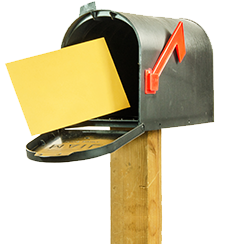 Summertime means the 2020 tax filing season is firmly in the rearview mirror for millions of Americans. But summertime is also the season when the IRS sends letters to unlucky taxpayers demanding more money!
Summertime means the 2020 tax filing season is firmly in the rearview mirror for millions of Americans. But summertime is also the season when the IRS sends letters to unlucky taxpayers demanding more money!
If you receive a notice from the IRS, do not automatically assume it is correct and submit payment to make it go away. Because of all the recent tax law changes and so little time to implement the changes, the IRS can be wrong more often than you think. These IRS letters, called correspondent audits, need to be taken seriously, but not without undergoing a solid review. Here’s what you need to do if you receive one.
- Stay calm. Don’t overreact to getting a letter from the IRS. This is easier said than done, but remember that the IRS sends out millions of these correspondence audits each year. The vast majority of them correct simple oversights or common filing errors.
- Open the envelope! You would be surprised how often taxpayers are so stressed by receiving a letter from the IRS that they cannot bear to open the envelope. If you fall into this category, try to remember that the first step in making the problem go away is to open the correspondence.
- Conduct a careful review. Review the letter. Understand exactly what the IRS is explaining that needs to be changed and determine whether or not you agree with their findings. The IRS rarely sends correspondence to correct an oversight in your favor, but sometimes it happens.
- Respond timely. The IRS will tell you what it believes you should do and within what time frame. Ignore this information at your own risk. Delays in responses could generate penalties and additional interest payments.
- Get help. You are not alone. Getting assistance from someone who deals with this all the time makes the process go much smoother. And remember, some of these letters could be scams from someone impersonating the IRS!
- Correct the IRS error. Once you understand what the IRS is asking for, a clearly written response with copies of documentation will cure most IRS correspondence audits received in error. Often the error is due to the inability of the IRS computers to match documents it receives (for example 1099s or W-2s) to your tax return. Pointing out the information on your tax return might be all it takes to solve the problem.
- Certified mail is your friend. Any responses to the IRS should be sent via certified mail or other means that clearly show you replied to their inquiry before the IRS’s deadline. This will provide proof of your timely correspondence. Lost mail can lead to delays, penalties, and additional interest tacked on to your tax bill.
- Don’t assume it will go away. Until receiving definitive confirmation that the problem has been resolved, you need to assume the IRS still thinks you owe them money. If no correspondence confirming the correction is received, you should follow-up with another written confirmation request to the IRS.
 Getting audited by the IRS is no fun. Some taxpayers are selected for random audits every year, but the chances of that happening to you are very small. You are much more likely to fall under the IRS’s gaze if you make one of several common mistakes.
Getting audited by the IRS is no fun. Some taxpayers are selected for random audits every year, but the chances of that happening to you are very small. You are much more likely to fall under the IRS’s gaze if you make one of several common mistakes.
That means your best chance of avoiding an audit is by doing things right before you file your return this year. Here are some suggestions:
Don’t leave anything out. Missing or incomplete information on your return will trigger an audit letter automatically, since the IRS gets copies of the same tax forms (such as W-2s and 1099s) that you do.
Double-check your numbers. Bad math will get you audited. People often make calculation errors when they do their returns, especially if they do them without assistance. In 2016, the IRS sent out more than 1.6 million examination letters correcting math errors. The most frequent errors occurred in people’s calculation of their amount of tax due, as well as the number of exemptions and deductions they claimed.
Don’t stand out. The IRS takes a closer look at business expenses, charitable donations and high-value itemized deductions. IRS computers reference statistical data on which amounts of these items are typical for various professions and income levels. If what you are claiming is significantly different from what is typical, it may be flagged for review.
Have your documentation in order. Be meticulous about your recordkeeping. Items that will support the tax breaks you take include: cancelled checks, receipts, credit card and investment statements, logs for mileage and business meals and proof of charitable donations. With proper documentation, a correspondence letter from the IRS inquiring about a particular deduction can be quickly resolved before it turns into a full-blown audit.
Remember, the average person has a less than 1 percent chance of being audited. If you prepare now, you can narrow your audit chances even further and rest easy after you’ve filed.